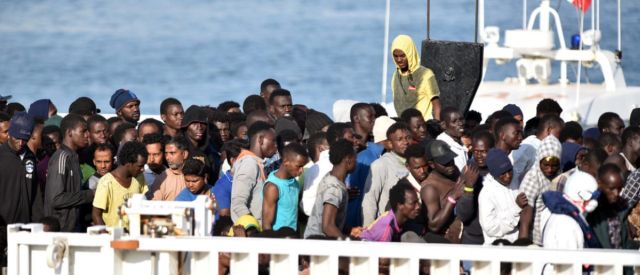
by admin | May 25, 2021 | World
 Washington : The US resettled 33,000 refugees in 2017, a roughly two-thirds drop from the figure of the previous year, which stood at 97,000, according to data from the UN High Commissioner for Refugees published in a report by US-based Pew Research Centre.
Washington : The US resettled 33,000 refugees in 2017, a roughly two-thirds drop from the figure of the previous year, which stood at 97,000, according to data from the UN High Commissioner for Refugees published in a report by US-based Pew Research Centre.
The decline in refugee resettlement in the US coincided with the arrival of Donald Trump in the White House in January 2017, Efe news reported on Friday citing the think thank.
This marks the first time that the US has received fewer refugees than the rest of the world combined since it adopted the Refugee Act in 1980. The country has taken 3 million of the 4 million refugees worldwide since 1980.
In 2016, during the tenure of former President Barack Obama, refugee resettlement in the US stood at 97,000 while that of other countries stood at 92,000.
The US continues to lead in refugee resettlement (33,000), followed by Canada (27,000), Australia (15,000), the UK (6,000) and Germany, Sweden, France and Norway (3,000 each).
Refugees represent nearly 30 per cent of the world’s displaced population. In 2017, about 56 per cent came from the Middle East and North Africa, especially Syria, while 23 per cent arrived from sub-Saharan countries and another 15 per cent from Asia.
Trump has lowered the refugee quota for the 2018 fiscal year to 45,000 from the 110,000 set by Obama for 2017. With three months left in the current 2018 fiscal year, the US has welcomed 16,000 refugees.
Trump criticized the refugee policy during his presidential campaign, saying that terrorists could come to the US in the guise of refugees.
—IANS
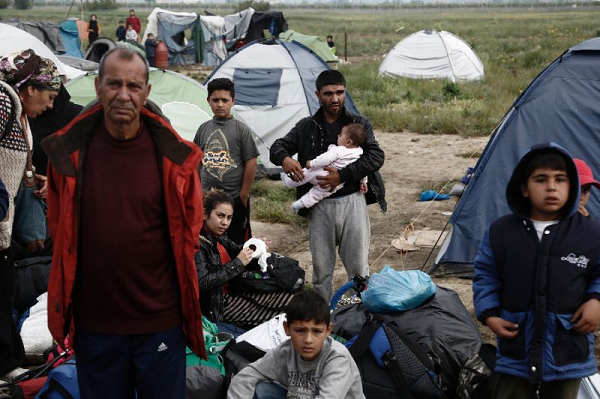
by admin | May 25, 2021 | World
 Paris (IANS)France pledged to take in 400 refugees per month from Greece, Interior Minister Bernard Cazeneuve announced on Thursday.
Paris (IANS)France pledged to take in 400 refugees per month from Greece, Interior Minister Bernard Cazeneuve announced on Thursday.
In a statement, Cazeneuve added that 97 refugees arrived this week from Greece and Italy. An additional 253 asylum seekers are due to come next week, Xinhua reported.
The French minister also reiterated determination to honour commitment to help handling migration crisis.
France promises to receive 30,000 refugees over the next two years.
Last September, European leaders agreed on the EU proposal to redistribute 160,000 refugees across European states in order to help struggling Greece to cope with chaotic flows of migrants at its doors.
Escalating wars in Syria and Iraq, adding to persistent political instability in many African countries and in the Middle East, forced millions of people to risk their lives by boarding rickety boats to seek better life on the other Mediterranean rim.
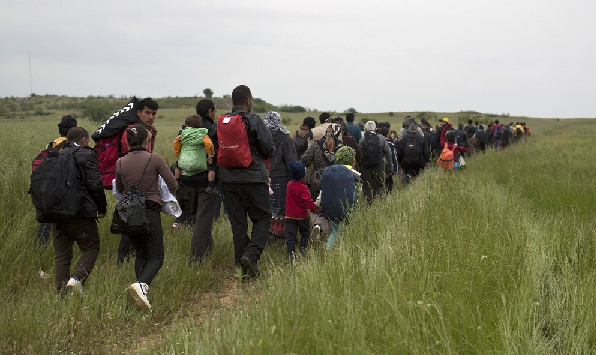
by admin | May 25, 2021 | Muslim World, Opinions
 Brussels, (IINA) – Refugees who arrived in Europe last year could repay spending on them almost twice over within just five years, the Guardian reported Wednesday, citing one of the first in-depth investigations into the impact incomers have on host communities.
Brussels, (IINA) – Refugees who arrived in Europe last year could repay spending on them almost twice over within just five years, the Guardian reported Wednesday, citing one of the first in-depth investigations into the impact incomers have on host communities.
Refugees will create more jobs, increase demand for services and products, and fill gaps in European workforces – while their wages will help fund dwindling pensions pots and public finances, said Philippe Legrain, a former economic adviser to the president of the European Commission.
Simultaneously refugees are unlikely to decrease wages or raise unemployment for native workers, Legrain said, citing past studies by labor economists.
Most significantly, Legrain calculates that while the absorption of so many refugees will increase public debt by almost €69billion between 2015 and 2020, during the same period refugees will help GDP grow by €126.6bn.
“Investing one euro in welcoming refugees can yield nearly two euros in economic benefits within five years”, concludes Refugees Work: A Humanitarian Investment That Yields Economic Dividends, a report released on Wednesday by the Tent Foundation, a non-government organization that aims to help displaced people.
Legrain added that he hope the report will dispel the myth that refugees will cause economic problems for western society.
“The main misconception is that refugees are a burden – and that’s a misconception shared even by people who are in favor of letting them in, who think they’re costly but it’s still the right thing to do”, said Legrain in an interview.
“But that’s incorrect. While of course the primary motivation to let in refugees is that they’re fleeing death, once they arrive they can contribute to the economy”.
While their absorption puts a short-term strain on public finances, Legrain said, it also increases short-term economic demand, which acts as a welcome fiscal stimulus in countries where demand would otherwise be weak. In the longer term, refugees will increasingly contribute to tax revenues, and also create jobs.
“To put it simply, there is not a fixed number of jobs to go around”, reads the report. “Refugees who take jobs also create them. When they spend their wages, they boost demand for the people who produce the goods and services they consume. And they also create jobs for people in complementary lines of work. For instance, refugees who become construction workers create jobs for locals who are supervisors or sell building supplies”.
Legrain also highlighted how refugees could solve an impending demographic challenge in Europe. “By 2030 the working-age population is projected to shrink by a sixth (8.7 million people) while the old-age population will grow by more than a quarter (4.7 million people)”, wrote Legrain. He suggested that an influx of younger refugees could help care and pay for the increasing population of pensioners.
However, Legrain warned that refugees’ positive economic impact would be hindered if Europe does not take immediate steps to accelerate refugees’ entry into the workforce.
He stressed that asylum seekers should be allowed to work while their applications are being processed in order to lessen their burden on the state. He also noted that they should be given language lessons as a matter of urgency, and are housed in areas where there are more jobs, rather than simply in places where the housing is cheapest.
Authorities should also speed up certification of qualifications obtained in countries of origin, Legrain said, citing how a delay in certifying Syrian pharmacists in Sweden is exacerbating a labor shortage in that sector of the Swedish economy.
Quick access to the job market “reduces their reliance on public funds, ensures they are contributing their labor and taxes to the host economy, helps them adapt faster to life in their new society, and lowers the chances that they will end up marginalized from the labor market and society on a longer-term basis”, the report concludes.
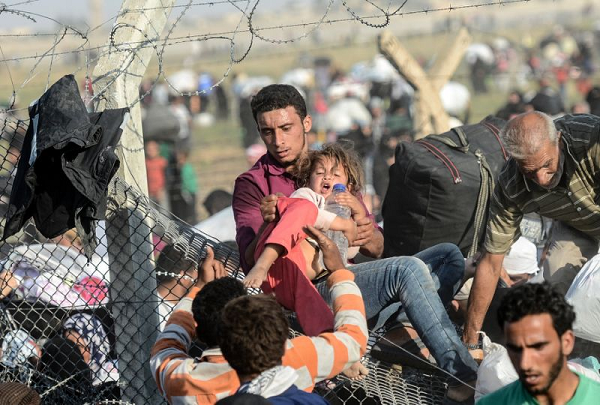
by admin | May 25, 2021 | Opinions
 Geneva (IINA) – The number of people internally displaced by conflicts around the world rose last year to a record 40.8 million people, a report released on Wednesday showed.
Geneva (IINA) – The number of people internally displaced by conflicts around the world rose last year to a record 40.8 million people, a report released on Wednesday showed.
“This is the highest figure ever recorded and twice the number of refugees worldwide,” said Jan Egeland, head of the Norwegian Refugee Council (NRC), co-authors of the report with the Geneva-based Internal Displacement Monitoring Centre (IDMC). Some 8.6 million internally displaced people (IDPs) linked to conflict were recorded in 2015, including 4.8 million in the Middle East and North Africa. “Displacement… has snowballed since the Arab spring uprising in 2010 and the rise of the Islamic State,” said the report, with Yemen, Syria and Iraq accounting for more than half of the total, AFP reported.
Outside the Middle East, the countries with the highest numbers of people fleeing were Afghanistan, Central African Republic, Colombia, Democratic Republic of Congo, Nigeria, South Sudan and Ukraine. The report also said 19.2 million people were internally displaced last year by disasters. India, China and Nepal accounted for the highest numbers with 3.7 million, 3.6 million and 2.6 million. Conflicts and natural disasters made for a total of 27.8 million new IDPs last year. “This is the equivalent of the combined populations of New York City, London, Paris and Cairo grabbing what they can carry, often in a state of panic, and setting out on a journey filled with uncertainty,” Egeland said.
Out of the top ten countries for IDPs, the report found that five — Colombia, Democratic Republic of Congo, Iraq, South Sudan and Sudan — have featured on the same ranking every year since 2003. The report also for the first time measured the numbers displaced by criminal violence associated with drug trafficking and gang activity — a problem it said remained “unquantified and unaddressed”. It estimated that there were a million IDPs in El Salvador, Guatemala, Honduras and Mexico as of December 2015 as a result of this type of violence.
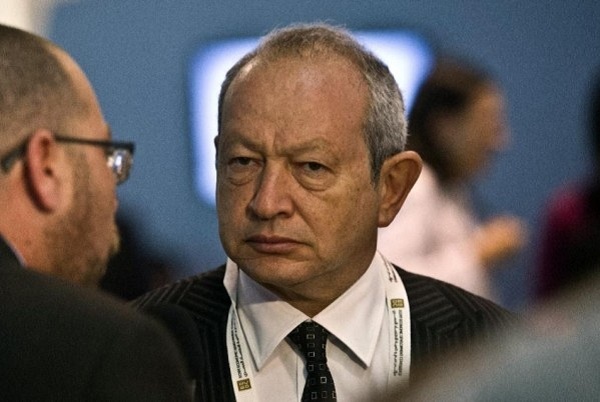
by admin | May 25, 2021 | Muslim World

Egyptian billionaire Naguib Sawiris
Miami (IINA) – Egyptian billionaire Naguib Sawiris, Chief Executive of Orascom TMT, has offered to buy a vacant island in the Mediterranean Sea and develop it to house thousands of refugees fleeing Syria.
Sawiris announced his offer on his Twitter account, making worldwide headlines. He made a call to, “Greece or Italy sell me an island, I’ll call its independence and host the migrants and provide jobs for them building their new country.”
Sawiris said during a television interview that he was willing to approach Greek and Italian governments about purchasing an island, regardless of the challenges and difficulties in regulations.
According to AFP, the billionaire is confident his plan would work: “Of course it’s feasible. You have dozens of islands which are deserted and could accommodate hundreds of thousands of refugees,” he noted.
The Egyptian mogul even talked to AFP about a plan for infrastructure. He said there would be “temporary shelters to house the people, then you start employing the people to build housing, schools, universities, hospitals. And if things improve [in their country], whoever wants to go back, goes back.”
The presumed cost of these Mediterranean islands ranges between $10 million and $100 million.
More than 3 million Syrians fled their country in the last few years of conflict and civil war in Syria and over 2,500 refugees lost their lives seeking new lands to live, according to the UN Refugee Agency.

 Washington : The US resettled 33,000 refugees in 2017, a roughly two-thirds drop from the figure of the previous year, which stood at 97,000, according to data from the UN High Commissioner for Refugees published in a report by US-based Pew Research Centre.
Washington : The US resettled 33,000 refugees in 2017, a roughly two-thirds drop from the figure of the previous year, which stood at 97,000, according to data from the UN High Commissioner for Refugees published in a report by US-based Pew Research Centre.



